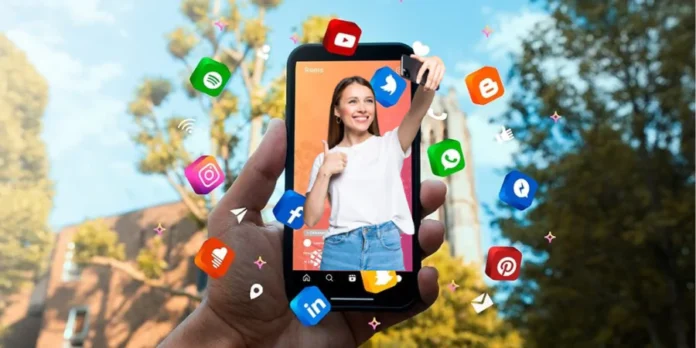These new-age celebrities are bursting with popularity, and shooting up their fame with likes, views, and shares erasing allographies. A bevy of fashion-touching, stylish fitness-loving, lifestyle vloggers, and budget-traveling enthusiasts are monitored daily by millions worldwide. The glitzy show is not without a dark side, as occurs with every fame-laden industry. Indeed, Influncersgonewild has itself become a term for a trend that has grown larger as people-turned-celebrities. Have begun pushing their boundaries and crossing ethical lines. Which ultimately leads down a spiral into craziness-on the quest for clout.
Idealism of Popularity Turns Problematic
Mainstream phenomena like this lure many people into building empires online through curated material. Offering careful branding, and engaging their fan bases, but as a result of having increased follower counts, the pressure to stay relevant builds to the point of them having to be bold and controversial-from public stunts and offensive statements to misleading promotions and personal scandals.
For example, Influncersgonewild who host non-existent giveaways, publicize products that aren’t really verified, or fake some portions of their lives for attention. While such things often get short-term stir, long-term credibility and audience trust are, unfortunately, lost. Generally speaking, shock value wins out in the domain of viral fame.
Emergence of “InfluencersGoneWild” Moments
Social media users and watchdog platforms have begun branding these missteps with their own terminology. “InfluencersGoneWild” is now more than a hashtag but rather a comment on the behaviors of online personalities who go too far. Whether it’s a YouTube user filming on famous hallowed grounds or a TikTok star spreading dangerous health advice, both highlight the risks of allowing worthless unregulated voices in such power.
The most prominent one is that number now increasing in the counts of Influncersgonewild indulging in “clout chasing,” which means doing reckless activities for fans and followers. These activities include unauthorized entries into restricted areas and performing stunts in an attempt to engage in a viral challenge that turns out to be dangerous. Even though these moments burn brightly for a time in everyone’s memory, they come at an ethical and legal cost.
Fame Without Responsibility
Not only that but also one of the primary drawbacks of Influncersgonewildi gone wild is the absence of management. Most celebrities with PR teams, agents, and media guidelines, however, are totally on their own. This is a beautiful thing for creative freedom, but there will be no responsibility when things fail.
In addition, a significant number of those followers are youth and impressionable; thus, they are lured into a trap of misinformation or manipulation. When celebrities endorse some unsafe skincare routine, a spurious diet, or a get-rich-quick scheme, such incidents prove real and harmful in their effects. Thanks to the fact that such seem to be outside the domain of journalistic or advertising standards, they mostly escape their claws-corporately, that is.
The Role of Cancel Culture
Public outrage is not entirely nonexistent; however. Most Influncersgonewild are quick to face the wrath of canceled culture when they commit a misdeed. A single tweet, video, or live stream can lead to a conflagration of criticism which results in loss of sponsorships, deletion of contents, and public apologies. Yet this reaction is not consistent: while some are permanently “canceled,” others manage to rebrand and come back stronger than before.
Such inconsistencies raise the question whether to cancel culture works or just perform. Influencers, however, seem to apologize not for genuine remorse but to save their image and income. Ultimately, it makes followers themselves to choose if they believe in redemption or to withdraw support.
The Mental Toll on Influencers
And there is also the psychological toll that fame takes on an influencer. The endless waiting for ideas, the fear of being irrelevant, and pressure from maintaining an online persona often lead a person to anxiety, burnout, or depression. Sometimes, it is from these mental health reasons that the “outlandish” behavior displayed on social media arises.
Mental health issues are real and deserving of empathy. However, they cannot be a shield for misbehavior. They point out the need for better support systems and for increased dialogue about the consequences of power.
Moving Towards Being a Responsible Influencer
At least, there is hope. Audiences become more selective and savvier when interchanging ideas about influencer culture, calling for more transparency, authenticity, and accountability. Increasingly, more Influncersgonewild are starting to lend their voices to these platforms for meaningful purposes by promoting awareness on mental health, advocating for social justice in their communities, and sharing their real experiences as opposed to filtered ones.
And just like that, social media platforms have begun putting stringent content guidelines and labeling requirements for sponsored posts. Although still early, these alone mark strides toward building a salubrious and honest digital space.
Conclusion
In short, the Influncersgonewild issue sums up the much larger problems facing the influencer economy. Social media fame is invariably empowering but weighs a huge psychological burden. The norm in the popular judgment is that, while celebrities create whole worlds in which trends, opinions, and behaviors transpire globally, it is hence just that, both for the creators and for the consumers, to demand higher standards of ethics and accountability within their folds.



